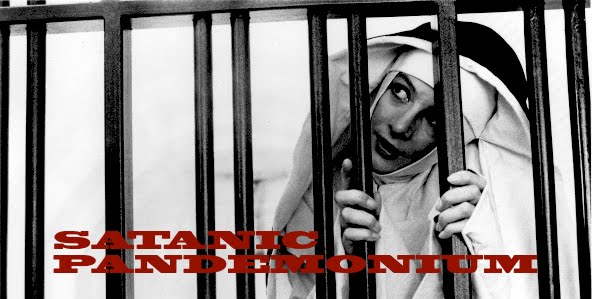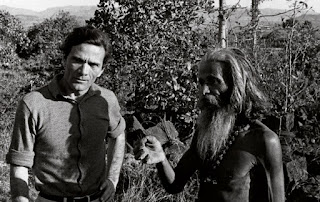Though Pasolini is primarily remembered for his feature films, poetry, and philosophy, he also made a handful of fascinating documentaries throughout his career. While I’ve already covered the full-length Comizi d’Amore and La rabbia, he made a number of shorter films primarily about his world travels that are difficult to get ahold of but no less fascinating than his features. Most of these were made while Pasolini was planning upcoming features and include his location scouting. It’s easy to remember Pasolini as such a thoroughly proud Italian writer and director — many of his films were set in Italy and the Mediterranean — but he traveled frequently throughout his life and captured a number of countries and cultures less seen by western viewers in the ‘60s and ‘70s.
Pasolini made Sopralluoghi in Palestina per il vangelo secondo Matteo (1965) when he went location scouting for The Gospel According to St. Matthew. He initially intended to shoot in the Middle East, but he came to find it too touristy and modern for his needs — he wound up shooting in southern Italy — but he brought a camera and captured his experiences in Palestine. Also known as Locations in Palestine for The Gospel According to Matthew, this is essentially a 55-minute travelogue of the Middle East a few years before war struck. Catholic priest Don Andrea assists with information about theology and history, while Pasolini discusses why the area is fascinating but why it won’t work for his film set in the ancient world. Another short, Le mural di Sana’a (1971) aka The Walls of Sana’a, is something of a companion piece and examines the ancient architecture of a a city in Yemen.
Appunti per un film sull'India (1968) aka Notes for a Film on India was Pasolini’s 25-minute TV documentary about Pasolini’s travels in India. He was again scouting for film locations — for a project about a maharaja that never saw the light of day — and captured his visit on film (with a score from Ennio Morricone). As in Love Meetings, he interviewed a wide range of people at a time when the country was struggling with its independence and extreme poverty (an issue that remains a serious problem). The documentary is a fascinating look at different regions of the country and viewpoints from a variety of citizens. Pasolini apparently loved the country — he also wrote a series of essays about his time there — and wanted to explore its mythology as well as its political climate.
Appunti per un’Orestiade africana (1970) Notes Towards an African Orestes is another documentary that is all that remains of an unrealized feature film idea. With this 70-minute glimpse at Africa in the late ‘60s, Pasolini attempted to parallel the Oresteia — Aeschylus’ tragic trilogy about the Greek general, Agamemnon, who sacrifices his daughter to win the Trojan War and sets in motion horrific events and family murder — with African politics of the day. A loose companion to Oedipus Rex and Medea, the feature film would have been fascinating to see realized, but the documentary is worth watching on its own. Pasolini talks to students and features a performance and, in many ways, this is a critical example of how Pasolini’s political philosophies were changing and an example of how he used cinema to express his deeply felt beliefs and observations about the world around him.
Other short examples exist, including Appunti per un romanzo dell’immondezza (1970), which I couldn’t find, and an interview with Ezra Pound that I would love to see as a full-length documentary. 12 dicembre (1972), his last, concerned a 1969 bombing in Milan, where several people were killed and an anarchist and activist, Giuseppe Pinelli, was held, illegally interrogated, and found dead. Though it was reported a suicide, it’s believed police killed him, though the case against a few police officers was eventually dropped. Like so many of Pasolini’s feature films, this remains oddly poignant at a time when police hostility — and violence against the innocent — is at a frightening high.
Many of these documentaries are hard to find, or they are included as special features in various DVD/Blu-ray releases of Pasolini’s films. I would love to see them restored, given new subtitles (or any subtitles, in some cases), and released together as a box set by Criterion, Masters of Cinema, or Arrow. If you’re a fan of Pasolini, travelogues, and the politics of the ‘60s and ‘70s, then all of these come recommended.




No comments:
Post a Comment